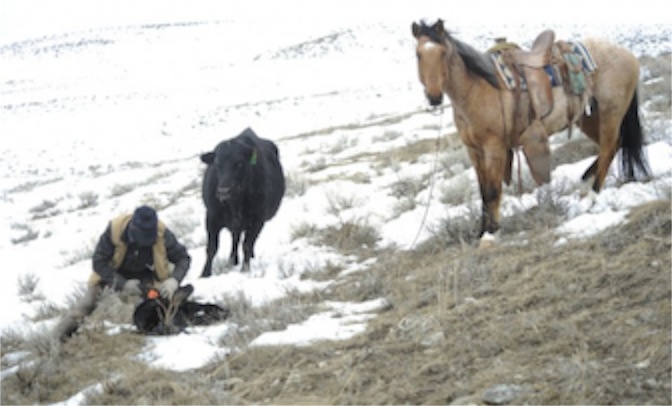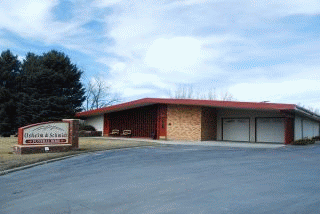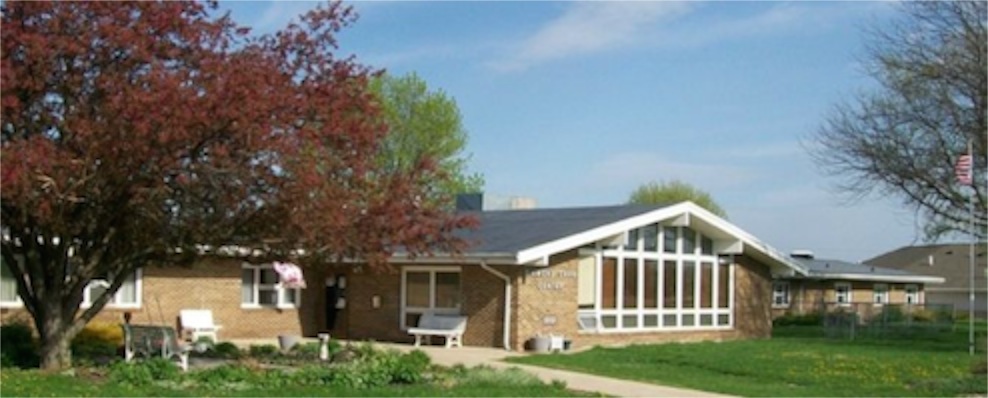Life and Death
18/02/12 04:46
I did not grow up in a ranch family. We lived in town, walked to school, and although our dad wasn’t always able to leave the shop at closing time, his place of work did have a closing time and we were used to eating our meals as a family at regular times. My earliest memories of life and death are of kittens some of which contracted distemper and died from the disease. Our father’s business and our town, however, were linked to the cycles of farm and ranch life and we were aware that when it was haying season ranchers needed parts regardless of the time of day and in calving season, vet supplies had to be made available when the ranchers had time to get to town. Dad would get up from the dinner table or his chair and head back to the shop when there was a need even if it was evening or Sunday.
 So I know that there are ranchers out there who are calving. Calving can be any time from January to April, with most of the ranchers preferring to have the bulk of their critters born when the weather is a bit better. The problem is that we can have some really mild Februarys and some really harsh Aprils and predicting the weather is always a challenge in Montana. It takes somewhere around 280 – 290 days for a Hereford to produce a calf and while the bulls know their job the exact day to let them into the pasture is more of an art than a science.
So I know that there are ranchers out there who are calving. Calving can be any time from January to April, with most of the ranchers preferring to have the bulk of their critters born when the weather is a bit better. The problem is that we can have some really mild Februarys and some really harsh Aprils and predicting the weather is always a challenge in Montana. It takes somewhere around 280 – 290 days for a Hereford to produce a calf and while the bulls know their job the exact day to let them into the pasture is more of an art than a science.
Birthing calves in the winter can be harsh. On a blustery March day with snow on the ground the first few minutes can be critical. That wet calf can get cold quickly. Ears, tails and noses can freeze quickly. And a calf whose nose is frozen too badly won’t make it. Ranch hands are used to sweeping up the critters to get them anywhere warm: the cab of a pickup, a barn, the porch or bathtub at the house. Most ranchers try to get the heifers to give birth first, before things get too hectic. A first-time momma cow may not know that it’s her job to get that calf cleaned up, standing and nursing. Sometimes she just needs help.
The point of all of this is that ranch folk live in the midst of the cycles of birth and death and develop an innate understanding of the realities of life, while most of the rest of us have quite a bit of isolation from these processes. In my work it is not at all uncommon for a high school or college student to face the death of a grandparent or distant relative as their first experience with a funeral home or the funeral customs of a church. While there are exceptions and there are times when we work with young children in the midst of grieving families, even our experiences of death are pretty sanitized. Keeping elders in family homes is less common these days and many people face the ends of their lives in institutions where paid staff take care of the messes and families witness only part of the process of aging and dying.
The result is that there are many people who have unrealistic expectations of life and death. Too many people have watched too many television shows and have misread too many statistics. They have an exaggerated expectation of what can and cannot be done by modern hospitals and doctors. In an age where surgeons can reattach limbs and repair tiny hearts of infants, we have come to think of doctors as having superpowers, and if not that at least superior technology and there are people who treat death as if it were an option instead of an obligation.
The truth is that we all will one day die. Human bodies wear out. Disease takes its toll. Some are allowed to go through the process rather quickly. Most have a period of disease and decline. There are lots of things that happen to humans that doctors cannot fix. The wondrous technology of a modern hospital does not change the fact that people die. In many cases MRIs and sophisticated pharmaceuticals only make the end of life more complex. They never prevent death and the prolonging of life can be an increase in the amount of suffering instead of a gift of improved life.
 I will be officiating at a funeral today. The man died young by today’s standards, but he died only after having outlived many of the people he loved. I was with him at the death of his father, his brother, a stepdaughter and his wife. The family home has been sold, but when I received the news of his death, I pictured that living room and the chairs where we sat with the little round table between them as we pondered the meaning of life and death and the weight of grief on several different occasions. The man whose funeral we will conduct today ended his life in a nursing home over 300 miles from our town. The drive takes more than four hours each way. A visit to him in that location would have meant a long day. I never made the trip. I did visit him in other nursing homes that were a part of the journey, but I just never got down the road after they moved him the last time. I suspect that he didn’t receive visits from his Kiwanis brothers or old Boy Scout Friends or the folks with whom he served on the Literacy Council. It has been six years since the time he asked me why he had to live so long. “Why can’t I just die?” he asked. It is a question for which I had no answer except the observation that we don’t get to choose the timing of our lives.
I will be officiating at a funeral today. The man died young by today’s standards, but he died only after having outlived many of the people he loved. I was with him at the death of his father, his brother, a stepdaughter and his wife. The family home has been sold, but when I received the news of his death, I pictured that living room and the chairs where we sat with the little round table between them as we pondered the meaning of life and death and the weight of grief on several different occasions. The man whose funeral we will conduct today ended his life in a nursing home over 300 miles from our town. The drive takes more than four hours each way. A visit to him in that location would have meant a long day. I never made the trip. I did visit him in other nursing homes that were a part of the journey, but I just never got down the road after they moved him the last time. I suspect that he didn’t receive visits from his Kiwanis brothers or old Boy Scout Friends or the folks with whom he served on the Literacy Council. It has been six years since the time he asked me why he had to live so long. “Why can’t I just die?” he asked. It is a question for which I had no answer except the observation that we don’t get to choose the timing of our lives.

Modern medicine has given many people the gift of recovered health. Some of the things that are done are nearly miraculous. But medicine is powerless to grant extra days or increased depth of meaning. Doctors are better at replacing hips than addressing loneliness. A physician friend once told me, “If I have a heart attack, do not resuscitate me. It’s my only shot at getting out of this life with my dignity intact.” He knew that a certain percentage of people, perhaps most of us, will face an extended time of decline and a stint in an institution on our way out of this life’s journey. It is not for us to choose. That same friend will occasionally speak wistfully of ranch folk: “No matter how nice you make the nursing homes, there are a few old ranchers who are determined to die out on the prairie with their boots on.”
We agree that the “old ranchers” have something going for them. There is an attraction to life lived a bit closer to the cycles of life and death and an avoidance of some of the trappings and technologies of modern medicine. We probably over romanticize that life in the same way that we over estimate the power of medical technologies.
In the end, dying is about relinquishing control: letting go. In God’s eyes there isn’t one death that is better or worse than another. In God’s eyes life always triumphs and resurrection is never distant.
I may not be a rancher, but God has given me the gift of being close at hand at the times of dying and grieving for many families. It is, I know, a blessing.

Birthing calves in the winter can be harsh. On a blustery March day with snow on the ground the first few minutes can be critical. That wet calf can get cold quickly. Ears, tails and noses can freeze quickly. And a calf whose nose is frozen too badly won’t make it. Ranch hands are used to sweeping up the critters to get them anywhere warm: the cab of a pickup, a barn, the porch or bathtub at the house. Most ranchers try to get the heifers to give birth first, before things get too hectic. A first-time momma cow may not know that it’s her job to get that calf cleaned up, standing and nursing. Sometimes she just needs help.
The point of all of this is that ranch folk live in the midst of the cycles of birth and death and develop an innate understanding of the realities of life, while most of the rest of us have quite a bit of isolation from these processes. In my work it is not at all uncommon for a high school or college student to face the death of a grandparent or distant relative as their first experience with a funeral home or the funeral customs of a church. While there are exceptions and there are times when we work with young children in the midst of grieving families, even our experiences of death are pretty sanitized. Keeping elders in family homes is less common these days and many people face the ends of their lives in institutions where paid staff take care of the messes and families witness only part of the process of aging and dying.
The result is that there are many people who have unrealistic expectations of life and death. Too many people have watched too many television shows and have misread too many statistics. They have an exaggerated expectation of what can and cannot be done by modern hospitals and doctors. In an age where surgeons can reattach limbs and repair tiny hearts of infants, we have come to think of doctors as having superpowers, and if not that at least superior technology and there are people who treat death as if it were an option instead of an obligation.
The truth is that we all will one day die. Human bodies wear out. Disease takes its toll. Some are allowed to go through the process rather quickly. Most have a period of disease and decline. There are lots of things that happen to humans that doctors cannot fix. The wondrous technology of a modern hospital does not change the fact that people die. In many cases MRIs and sophisticated pharmaceuticals only make the end of life more complex. They never prevent death and the prolonging of life can be an increase in the amount of suffering instead of a gift of improved life.


Modern medicine has given many people the gift of recovered health. Some of the things that are done are nearly miraculous. But medicine is powerless to grant extra days or increased depth of meaning. Doctors are better at replacing hips than addressing loneliness. A physician friend once told me, “If I have a heart attack, do not resuscitate me. It’s my only shot at getting out of this life with my dignity intact.” He knew that a certain percentage of people, perhaps most of us, will face an extended time of decline and a stint in an institution on our way out of this life’s journey. It is not for us to choose. That same friend will occasionally speak wistfully of ranch folk: “No matter how nice you make the nursing homes, there are a few old ranchers who are determined to die out on the prairie with their boots on.”
We agree that the “old ranchers” have something going for them. There is an attraction to life lived a bit closer to the cycles of life and death and an avoidance of some of the trappings and technologies of modern medicine. We probably over romanticize that life in the same way that we over estimate the power of medical technologies.
In the end, dying is about relinquishing control: letting go. In God’s eyes there isn’t one death that is better or worse than another. In God’s eyes life always triumphs and resurrection is never distant.
I may not be a rancher, but God has given me the gift of being close at hand at the times of dying and grieving for many families. It is, I know, a blessing.